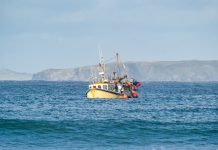The UK’s Secretary of State for Environment, Food and Rural Affairs Michael Gove sets out his vision for the future of the natural environment
In 1970, the incoming Conservative Government of Edward Heath created this country’s first Department of the Environment. The new Department published a White Paper on our natural heritage in 1972 which was entitled ‘How Do you Want to Live?’
In the 45 years since he wrote we have lost green space, cut down trees, sacrificed meadow and heathland, polluted our earth, air and water, we placed species in danger and we’ve run down the renewable resources – from fish to soil – on which our future depends. Farmland bird numbers have been cut in half, species have been devastated, bees and other pollinators threatened.
And at the same time, across the globe, we’ve seen climate change threaten both fragile natural habitats and developing human societies, we’ve allowed extractive and exploitative political systems to lay waste to natural resources and we’ve placed species of plants and animals in new and mortal danger while gambling with the future health of the whole world.
Unless we take the right environmental action, we risk seeing more species die out, with potentially undreamt-of consequences in terms of the health and balance of nature. We risk flood damage to the homes in which we live and devastation to the islands that others know as their only home. We will see the forward march of deserts compelling populations to be on the move and the growing shortage of water creating new conflicts and exacerbating old rivalries.
Indeed, ultimately, the air we breathe, the water we drink, the food we eat and the energy which powers enterprise, are all threatened if we do not practice proper stewardship of the planet.
If we consider the fate of past societies and civilisations, it has been, again and again, environmental factors that have brought about collapse or crisis. The Pulitzer Prize-winning academic Jared Diamond has, brilliantly, anatomised the forces which led to past civilisational destruction – deforestation and habitat destruction; soil problems such as erosion, salinization, and soil fertility losses; water management problems; overhunting; overfishing; and the effects of introduced species on native species.
He has also outlined the contemporary environmental threats that we now face with irresistible clarity – climate change, the build-up of toxins in our soil, air and oceans and the spiralling level of resource consumption, waste generation and demand for energy which all threaten human progress in the future.
Now, of course, there is a huge difference in the scale and duration of seventeenth century climate impacts and the current man-made crisis. And the technological breakthroughs that mankind has pioneered in recent years, the greater scientific knowledge that we now enjoy, the computational power of the machinery in our own hands, means that we live in a radically different world to our ancestors.
But we live on the same planet. The only one we know which can sustain human life. And the history of humanity on this planet tells us that, again and again, societies and civilisations have been gripped by hubris, by the belief that this time is different. That the cycles of the past have been broken. And we have seen, recently and all too graphically, how hubris in the financial markets, the belief among some that they had become not just a global elite but masters of the universe, led to economic disaster.
Science, technology, computational power are certainly critical to shaping our future, and as I shall go on to argue at greater length later in this speech, but if we imagine they can liberate us from the need to safeguard our environment, to protect the species we share this planet with, to protect and purify our air and our oceans, to keep our earth fertile and ensure that we can renew our natural resources, then we will have succumbed to the hubris which has wrought such devastation in the past, and which in the future may condemn us to much worse than economic hardship.
So, we should not aim simply to halt or slow the deterioration of our environment. We must raise our ambitions so we seek to restore nature and reverse the decline. This government was elected on a pledge to be the first to leave the environment in a better state than we inherited it. While the need for action on the environment has rarely been greater there are also, at this moment, forces at work which make me optimistic about our capacity to rise to this challenge – and optimistic about the role our country can play.
The future can be better
The first reason for optimism is the idealism and commitment of so many in our society, of all ages but especially among young people. Environmental organisations – from WWF to the RSPB, the Wildlife Trusts to Greenpeace and Friends of the Earth – enjoy memberships in the tens and hundreds of thousands, and the support of millions more and a capacity to move hearts more powerful than any other set of institutions in our civil society.
And their campaigning energy and idealism, while occasionally uncomfortable for those of us in power, who have to live in a world of compromise and deal-making, is vital to ensuring we continue to make progress in protecting and enhancing our environment.
On everything from alerting us all to the danger posed by plastics in our oceans and nitrogen oxide in our air, to the threats posed to elephants by poaching and cod by over-fishing, it’s been environmental organisations which have driven governments to make progress. They have demonstrated that we can, with sufficient will, halt and reverse those trends and forces degrading the natural world and we can, if we have that will, improve the environment we are handing on to the next generation.
Science is our guide to the future
Now I have been frank before when talking about animal welfare and my feelings for landscape, wildlife and natural beauty spring from sentiment. Growing up between the North Sea and the Cairngorms, spending weekends in the hills and weekdays with my head in Wordsworth and Hardy, Lewis Grassic Gibbon and Edward Thomas, I grew up with an emotional attachment to natural beauty which inevitably influences my feelings towards questions on everything from architecture to ivory.
But while natural beauty moves us deep in our souls, an environmental policy also needs to be rooted, always and everywhere, in science. There will, of course, always be a need to make judgements about the best method of achieving environmental goals, in ways which improve rather than upend people’s lives. But it is only by adherence to scientific method, through recognising the vital importance of testing and re-testing hypotheses in the face of new evidence and through scrupulous adherence to empirical reasoning, that we can be certain our policies are the best contemporary answer to the eternal questions of how we live well and honour the world we have inherited and must pass on enhanced to our children.
And it is science that guides my approach to another issue where my emotions have been powerfully engaged – fishing. My father, grandfather and great-grandfather all made their living from the sea. My great-grandfather was a fisherman, my grandfather and father fish merchants. My father’s business closed in the 1980’s when I was a schoolboy, one of many that closed after this country accepted EU control of our waters through the Common Fisheries Policy.
The CFP has had a profound impact on the UK’s coastal communities. But its most profound impact has been on the sustainability of our fish stocks. Fisheries management should always be guided by science – by a hard-headed assessment of which species and stocks can be fished and which must be protected if their numbers are not to dip below sustainable levels. The tragic precedent of over-fishing off the Grand Banks, and indeed current overfishing practices off the coast of Africa, shows how easy it can be to destroy what should be a perpetually-renewable natural resource.
The CFP has been reformed in recent years, not least thanks to the efforts of my friend and colleague Richard Benyon. The benefits of improved environmental stewardship have been seen in the resurgence of North Sea cod. But it is still the case that 40% of fish stocks in the Atlantic, North Sea and Baltic Sea are being fished at unsustainable levels. By leaving the CFP, taking back control of our territorial waters, granting access to other countries and allocating quotas all on the basis of what is scientifically sustainable, we can ensure that we set and follow the very highest standards in marine conservation.
And that, in turn, should lead to the revival of our coastal communities. With UK control of waters in our exclusive economic zone we cannot just husband fish stocks more wisely – we can also ensure that we allow our fishing industry to grow sustainably in the future as well. Outside the EU, as an independent coastal state, we can be home to world-class fishing fleets as well as proving ourselves environmental leaders.
And it is not just through reform of a fishing policy that we can ensure the marine environment is restored to health. Eight million tonnes of plastic are discarded into the world’s oceans each year, putting marine wildlife under serious threat.
In October 2015, the government introduced the 5p carrier bag charge. Figures released show that policy’s enormous success – 9 billion fewer carrier bags distributed since the charge was introduced, a fall of 83%. More than £95 million has also been raised from the charge, has been donated to environmental, educational and other good causes.
But this work in order to protect our marine environment is not good enough. Last year the government launched a consultation on banning microbeads in personal care products, which have such a devastating effect on marine life. We are responding to that consultation and we will introduce legislation to implement that ban later this year.
But there is more we can do to protect our oceans, so we will explore new methods of reducing the amount of plastic – in particular, plastic bottles – entering our seas. I want to improve incentives for reducing waste and litter and review the penalties available to deal with polluters – all part of a renewed strategy on waste and resources that look ahead to opportunities outside the EU.
As custodians of the fifth largest marine estate in the world, we have a responsibility in the UK to protect these unique and fragile environments. So, we will continue to fight to uphold the moratorium on commercial whaling. And by completing the Blue Belt of marine protected areas around the UK and working with our Overseas Territories we hope to create the world’s largest marine sanctuaries, we hope to deliver over 4 million square kilometres of protected maritime areas by 2020.
Outside the European Union, there is scope for Britain not just to set the very highest standards in marine conservation, but also to be a global leader in environmental policy across the board. Informed by rigorous scientific analysis, we can develop global gold standard policies on pesticides and chemicals, habitat management and biodiversity, animal welfare and biosecurity, soil protection and river management and indeed in many other areas.
We can take smarter and more targeted approaches to the improvements that we want to see – for instance, we can incentive recycling according to the environmental impact and value of the material, rather than a crude weight-based target that currently focuses recycling on things that happen to be heavy.
Shaping a greener future
Now in the past, the United Kingdom played a leading role in establishing the world’s most successful environmental treaty – the Montreal Protocol which has protected the ozone layer by phasing out the chemicals that UK scientists had shown was destroying it.
We are fortunate that in this country we do have innovative private sector players who can work with government and respond to smart, and ambitious, regulation and targets to help us meet new environmental demands while also generating growth. I hope to say more about some of the ambitions we want the private sector to help us achieve real gains around clean, green, growth.
And it’s important that government and the private sector work together because scientific advances and technological breakthroughs are rarely the sole preserve of the state or the market. The huge commercial success of America’s Silicon Valley was built on Government investment. It was the state-run Defence Advanced Research Projects Agency and the federally-funded NASA which generated the initial breakthroughs on which subsequent commercial success was built.
Similarly, the success of Israel’s amazingly creative tech sector has been built on that nation’s investment as it happens in defence technology. And the private sector innovation which has been generated by state investment in R&D in America and Israel could be matched by private sector innovation here built on public sector leadership and investment in rigorous environmental science.
I hope we can say more in this area not just in the BEIS Clean Growth Plan but also in what will be its sister document – DEFRA’s 25-year Environment Plan. Now I know there has been understandable impatience that the Plan has been longer in gestation than a baby elephant.
But I want to make sure our plan is as ambitious as possible. Critical to its success will be adopting as rigorous a methodology as possible to setting goals and reporting success or failure. Which is why I have written to Professor Dieter Helm, the Chair of the Natural Capital Committee, to ask his Committee to draw up advice on what our Plan should aim to achieve and how it should seek to do so.
And next year, I will also be publishing the second National Adaptation Programme, a comprehensive plan of action to improve our resilience to climate change – an area where Defra is the lead government department, a responsibility I take very seriously.
I have set out what I believe is a deliberately ambitious agenda because I believe the times demand it. Leaving the EU gives us a once in a lifetime opportunity to reform how we manage agriculture and fisheries, and therefore how we care for our land, our rivers and our seas. And we can recast our ambition for our country’s environment, and the planet.
In short, it means a Green Brexit. When we speak as a Government of Global Britain it is not just as a leader in security or an advocate for freer trade that we should conceive of our global role but also a champion of sustainable development, an advocate for global social justice, a leader in environmental science, a setter of gold standards in protecting and growing natural capital, an innovator in clean, green, growth and an upholder of the moral imperative to hand over our planet to the next generation in a better condition than we inherited it. That is my department’s driving ambition – and it should be central in the next five years to our national mission.
© Crown copyright. you can read the full version at: gov.uk/defra
The Rt Hon Michael Gove MP
Secretary of State for Environment, Food and Rural Affairs
Department for Environment, Food & Rural Affairs
+44 (0)20 7238 6951
www.gov.uk/government/organisations/department-for-environment-food-rural-affairs











